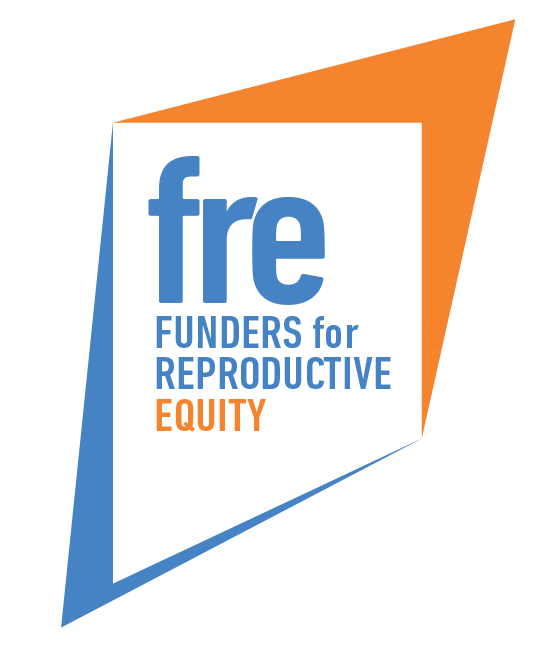The following is an annotated list of additional resources that funders have found useful in learning about reproductive justice organizations and the reproductive justice movement. It is by no means an exhaustive list and represents our first attempt at listing publications that we have used in our work. If you come across a resource or publication that is not listed here that you think would be helpful to funders, please let us know in the Comments Section of this toolkit. We have provided you with the links and or pdf files for easy access to them.
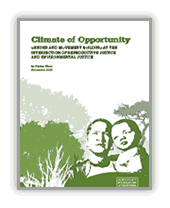
Surina Khan, "Climate of Opportunity: Gender and Movement Building at the Intersection of Reproductive Justice and Environmental Justice", Women’s Foundation of California, November 2006.
Beginning in 2008, the Women’s Foundation of California brought together grant partners working in the Reproductive Justice and Environmental Justice Movements to form the Environmental Justice/Reproductive Justice (EJ/RJ) Collaborative. The Foundation has seen firsthand how joint advocacy generates more inclusive movements and stronger outcomes for communities. Climate of Opportunity summarizes the EJ/RJ Collaborative as a reference for funders, policymakers, organizations and others interested in joint advocacy work. The report includes a set of recommendations to funders and is a complementary report to Fertile Ground; Women Organizing at the Intersection of Environmental Justice and Reproductive Justice published by the Movement Strategy Center.
Download PDF:
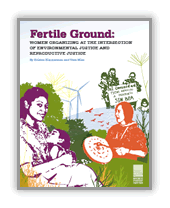
Kristen Zimmerman and Vera Miao, "Fertile Ground: Women Organizing at the Intersection of Environmental Justice and Reproductive Justice", Movement Strategy Center, November 2009.
"Fertile Ground" explores the ideas and work of 24 organizations across the country working at the intersection of environmental health and justice. The purpose of the report is to highlight the contributions these groups are making to secure safer and healthier environments for all women, children, and communities and to examine how an intersectional approach to organizing and movement building can lead to more powerful outcomes at all levels. The report discusses factors that make reproductive organizations effective and is a complementary report to Climate of Opportunity: Gender and Movement Building at the Intersection of Reproductive Justice and Environmental Justice, published by the Women’s Foundation of California.
Download PDF:
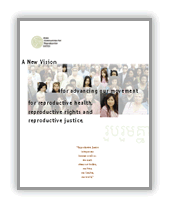
"A New Vision for Advancing Our Movement for Reproductive Health, Reproductive Rights, and Reproductive Justice", Asian Communities Reproductive Justice, 2005.
This paper discusses the three main frameworks for addressing reproductive health and rights, the historical context for the development of these frameworks, and the creation of a Women of Color-led reproductive justice movement. While the paper focuses mostly on the reproductive justice framework, it also describes the reproductive health and reproductive rights frameworks and shows how all three frameworks provide a complementary and comprehensive approach to addressing reproductive oppression. The paper discusses the reproductive justice framework as one that stipulates that reproductive oppression is a result of the intersections of multiple oppressions and is inherently connected to the struggle for social justice and human rights.
Download PDF:
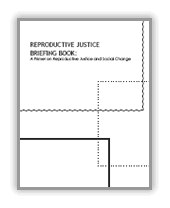
"Reproductive Justice Briefing Book: A Primer on Reproductive Justice and Social Change", Sistersong Women of Color Reproductive Health Collective and the Pro-Choice Public Education Project, 2007.
This is an anthology and was developed by the Sistersong Women of Color Reproductive Health Collective and the Pro-Choice Public Education Project in collaboration with many others for the 2007 United States Social Forum. This resource is comprised of a series of 1-2 page “primers” on how reproductive justice intersects with various communities and issues. Topics addressed in this briefing book include the need for comprehensive sex education, health care reform, race dynamics, immigrant rights, the rights of incarcerated mothers, assisted reproductive technologies, environmental justice, religion as well as providing a global lens to reproductive justice. At the conclusion of each brief paper, the authors provide a list of additional resources for those interested in learning more about a specific topic. These brief descriptions, written by academics and activists, provide an important insight into how reproductive justice intersects with myriad issues impacting women, their families and their communities.
Download PDF:
pdf Reproductive Justice Briefing Book: A Primer on Reproductive Justice and Social Change (611 KB)
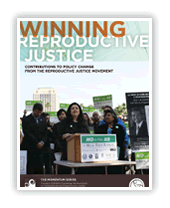
Moira Bowman (principal author), "Winning Reproductive Justice: Contributions to Policy Change from the Reproductive Justice Movement", The Momentum Series, a project of EMERJ: Expanding the Movement for Empowerment and Reproductive Justice, Volume 1.
This publication documents the ways the Reproductive Justice Movement is making specific contributions to U.S. policy change. Using specific examples of organizing efforts, the paper examines five policy change strategies that demonstrate the reproductive justice framework These strategies include naming and framing reproductive justice for communities at the margins; organizing communities traditionally left out of political calculations; using short-term tactics that build toward long-term change; building political power through values-based coalitions; and proactive issue campaigns.
Download PDF:
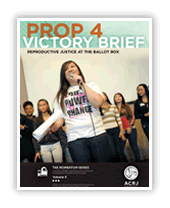
"Prop 4 Victory Brief". This publication documents how organizing to defeat California’s Prop 4 ballot initiative on parental notification served as a catalyst for increasing efforts to engage communities of color in critical voter education strategies while simultaneously supporting new leaders and building new coalitions. It describes the creation of the Reproductive Justice Alliance, a group of organizations in the state that worked together, sharing resources, ideas and strategies. The document also shows how they emerged from this experience stronger and better equipped to move a proactive agenda for reproductive justice.
Download PDF:
pdf Prop 4 Victory Brief: Reproductive Justice at the Ballot Box (1.24 MB)
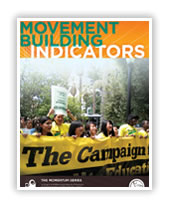
Maria Nakae, Moira Bowman and Eveline Shen (principal authors), "Movement Building Indicators", The Momentum Series, a project of EMERJ: Expanding the Movement for Empowerment and Reproductive Justice, Volume 6, Asian Communities for Reproductive Justice, 2009.
This publication provides a list of indicators for assessing reproductive justice work. Its shows how the “one size fits all” approach to assessing change strategies overlooks both the real work of the processes that need to be put in place and the contributions of groups who are working deeply rather than at a scale of mass mobilization. The document addresses four key areas of movement building that are core strengths of the Reproductive Justice Movement: policy change; leadership development; communications; and relationship building.
Download PDF:
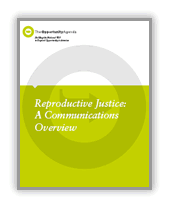
"Reproductive Justice: A Communications Overview", Opportunity Agenda, 2009.
This document is a survey of the reproductive justice movement’s communications goals, activities and capacity. It represents the first step in a year-long communications planning process initiated by the Ford Foundation, The Opportunity Agenda, and a cohort of reproductive justice organizations. It is based on a series of one-on-one and group interviews and discussions with reproductive justice leaders and thinkers, a review of web-based and print materials produced by various organizations, and discussion at two gatherings of reproductive justice organizations. The purpose of this exploration was to develop a picture of the field as a whole which can serve as a baseline for determining next steps and measuring progress, rather than to examine in depth the communications activities of individual organizations. The document contains four case studies which are also available below as separate PDF documents.
Download PDF:
pdf Reproductive Justice: A Communications Overview (1.61 MB)
Case Studies:
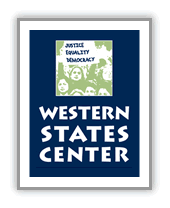
Western States Center, “Timeline of Reproductive Oppression and Justice.”
This is a workshop on the historical context of reproductive health oppression of Women of Color and the activism that created change and that evolved into the reproductive justice movement. The workshop, which has been used by funders as well as other organizations, is facilitated by Kalpana Krishnamurthy, Gender Justice Program and RACE Program Dire4ctor, Western States Center, Portland, Oregon.
Visit Web site: www.westernstatescenter.org.
